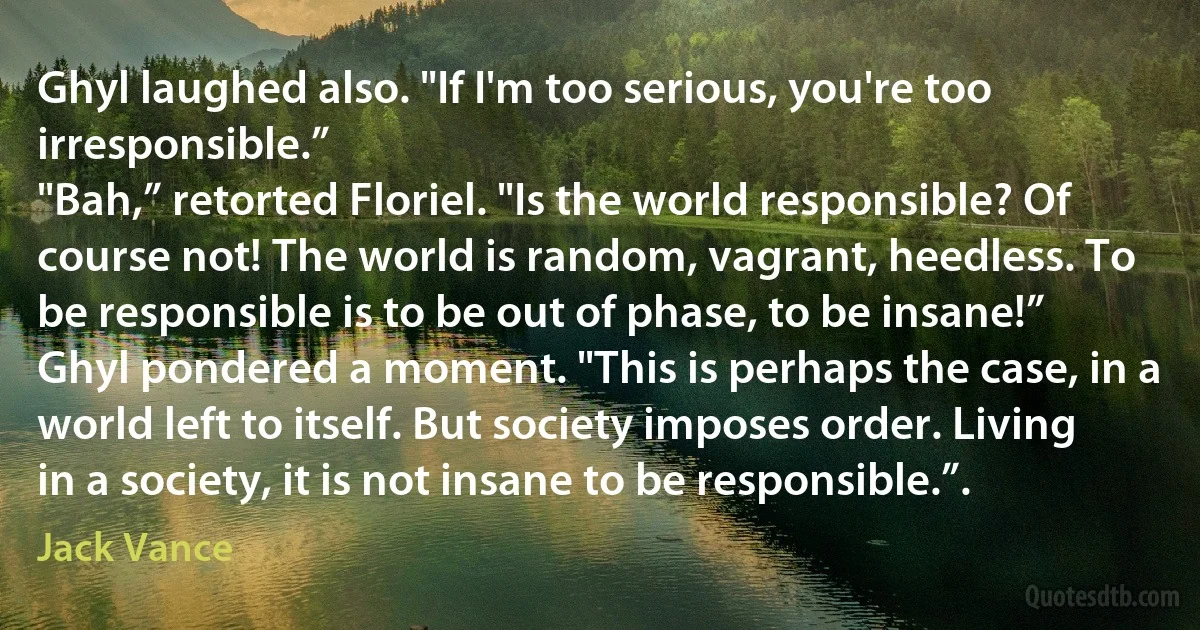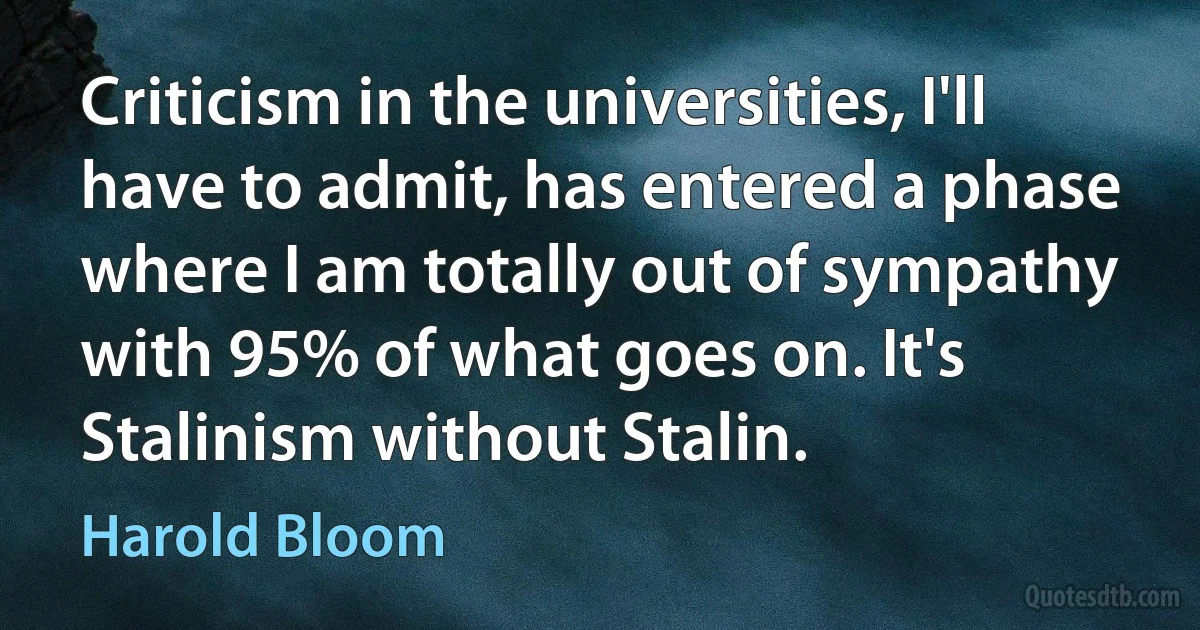Phase Quotes - page 5
We go to battle against the plutocratic and reactionary democracies of the west... This gigantic struggle is nothing other than a phase in the logical development of our revolution; it is the struggle of peoples that are poor but rich in workers against the exploiters who hold on ferociously to the monopoly off all the riches and all the gold of the earth...

Benito Mussolini
The revolution of 1832 was, therefore, in its ultimate results, a democratic revolution, though its earlier form was transitional and incomplete. This form was productive of great advantages for the time: indeed, for some years it might be said, without exaggeration, that the accidental equilibrium of political forces which it had produced presented the highest ideal of internal government the world had hitherto seen. But it was not the less provisional on that account. The forces by which political organisms are destroyed were, for the time, balanced by influences which still lingered, and were, therefore, neutralised. But these were increasing, and the others were decaying, and the balance could not last for any length of time. It has now been finally upset, and we have now fully reached the phase of political transformation to which the revolution of 1832 logically led.

Robert Gascoyne-Cecil, 3rd Marquess of Salisbury
I had now reached that phase of the disorder where all sense of hope had vanished, along with the idea of a futurity; my brain, in thrall to its outlaw hormones, had become less an organ of thought than an instrument registering, minute by minute, varying degrees of its own suffering.

William Styron
Much of what we do as adults is based on this imitative absorption during our childhood years. Frequently we imagine that we are behaving in a particular way because such behaviour accords with some abstract, lofty code of moral principles, when in reality all we are doing is obeying a deeply ingrained and long 'forgotten' set of purely imitative impressions (along with out carefully concealed instinctive urges) that makes it so hard for societies to change their customs and their 'beliefs'. Even when faced with exciting, brilliantly rational new ideas, based on the application of pure, objective intelligence, the community will still cling to its old home-based habits and prejudices. This is the cross we have to bear if we are going to sail through our vital juvenile 'blotting-paper' phase of rapidly mopping up the accumulated experiences of previous generations. We are forced to take the biased opinions along with the valuable facts.

Desmond Morris
If we're not working in order to get rich, then why are we working at all? What are we supposed to do all day? Just sit home and watch TV?
Not at all, but thinking so is a temporary phase many people go through - when the values of the old world no longer have a hold on us, but the values of the new don't yet grab your soul. They will.

Marianne Williamson
It (i. e., agriculture) was the most profound revolution in hominid living since Homo erectus had left the forest and committed themselves to the savannah. Compared to this phase shift, the advances of the future-even genetic engineering-were details. There would never be so significant a change again, not until humans themselves disappeared from the planet.

Stephen Baxter
Let's discuss the world. To answer the question, "is globalisation possible without God", the simple answer is "yes". Globalisation is after all itself a code word, a mask, for not using the C-word, capitalism. Globalisation is basically the latest phase of expanding capitalism. This not something which is neutral, this is a capitalism that has its rules: it has its economic rules, it has its political rules, it has its cultural rules and it has its military rules. It is a system. At the heart of this system is the United States of America, the world's only existing empire today. The first time in the history of humanity that you have just had a single empire, so dominant, whose military budget is higher than the military budgets of the next 15 countries put together, and whose military-industrial complex itself is the eleventh largest economic entity in the world. This is the reality we live in, and this is the reality which confronts us in different ways.

Tariq Ali
Thus it was that America sank further and further into Americanism. Vast wealth and industry, and also brilliant invention, were concentrated upon puerile ends. In particular the whole of American life was organized around the cult of the powerful individual, that phantom ideal which Europe herself had only begun to outgrow in her last phase. Those Americans who wholly failed to realize this ideal, who remained at the bottom of the social ladder, either consoled themselves with hopes for the future, or stole symbolical satisfaction by identifying themselves with some popular star, or gloated upon their American citizenship, and applauded the arrogant foreign policy of their government. Those who achieved power were satisfied so long as they could merely retain it, and advertise it uncritically in the conventionally self-assertive manners.

Olaf Stapledon
In their brief primitive phase, the Fifth Men, like so many other races, sought to console themselves by unreasoning faith in a life after death, They conceived, for instance, that at death terrestrial beings embarked upon a career continuous with earthly life, but far more ample, either in some remote planetary system, or in some wholly distinct orb of space-time. But though such theories were never disproved in the primitive era, they gradually began to seem not merely improbable but ignoble.

Olaf Stapledon
As a child I was really into fantasy books with elves and goblins and swords, and I went through a phase for a few years when I was reading endless series. But in the end I became totally fed-up with all these sub-Tolkien rip-offs because they all end up doing the same old things and there's no rigour to it.

Jonathan Stroud
I was hanging out the other night with a bunch of friends I've known forever. They were saying, "Look at you. You've grown into a swan." I looked at them and said, "My awkward phase lasted about three years longer than all of yours combined." I related to the physical and emotional awkwardness Mia goes through. She has incredibly low self-esteem. A lot of my life was spent having the same thing, but I'm getting over that now.

Anne Hathaway
The fact that this enterprise is being begun in one of our new states not yet great in population, not largely developed in its resources, discloses that the old American spirit still goes where our people go, still dominates their lives, still inspires them to deeds of devotion and sacrifice. It is but another illustration of the determination of our people to use their material resources to minister to their spiritual life. This memorial will be another national shrine to which future generations will repair to declare their continuing allegiance to independence, to self-government, to freedom and to economic justice. It is an inspiring phase of American life that men are willing to devote their energies to the erection of a memorial of this nature. Money spent for such a purpose is certain of adequate returns in the nature of increased public welfare.

Calvin Coolidge



